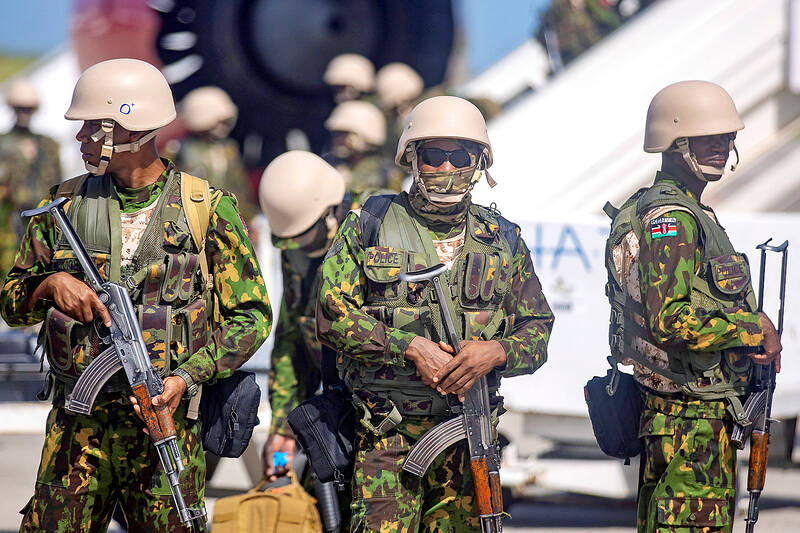The first UN-backed contingent of foreign police arrived in Haiti on Tuesday, nearly two years after the troubled Caribbean country urgently requested help to quell a surge in gang violence.
A few hundred police officers from Kenya landed in the capital, Port-au-Prince, whose main international airport reopened late last month after gang violence forced it to close for nearly three months.
It was not immediately known what the Kenyans’ first assignment would be, but they are to face violent gangs that control 80 percent of Haiti’s capital and have left more than 580,000 people homeless across the country as they pillage neighborhoods in their quest to control more territory. Gangs also have killed several thousand people in the past few years.

Photo: Reuters
The Kenyans’ arrival marks the fourth major foreign military intervention in Haiti. While some Haitians welcome them, others view the force with caution, given that the previous intervention — the UN’s 2004-2017 peacekeeping mission — was marred by allegations of sexual assault and the introduction of cholera, which killed nearly 10,000 people.
Romain le Cour, a senior expert at the Global Initiative Against Transnational Organized Crime, urged the international community and government officials to share details, including the mission’s rules of engagement and concept of operation.
“What is going to happen vis-a-vis the gangs,” he said. “Is it a static mission? Is it a moving mission? All those details are still missing, and I think it’s about time that there’s actually transparency.”
Hours after the Kenyans landed, Haitian Prime Minister Garry Conille thanked the East African country for its solidarity, saying that gangs have made Haiti “unlivable.”
“The country is going through very difficult times,” he told a news conference. “Enough is enough... We’re going to start working little by little to retake the country.”
Conille said the Kenyans would be deployed in the next couple of days, but he did not provide details.
He was accompanied by Kenyan National Security Adviser Monica Juma.
The Kenyans would “serve as agents of peace, of stability, of hope,” Juma said.
“We stand united in our commitment to support Haiti’s National Police to restore public order and security,” she said. “It is our hope that this will not become a permanent mission.”
The deployment comes nearly four months after gangs launched coordinated attacks, targeting key government infrastructure in Haiti’s capital and beyond. They seized control of more than two dozen police stations, fired on the main international airport and stormed Haiti’s two biggest prisons, releasing more than 4,000 inmates.

REVENGE: Trump said he had the support of the Syrian government for the strikes, which took place in response to an Islamic State attack on US soldiers last week The US launched large-scale airstrikes on more than 70 targets across Syria, the Pentagon said on Friday, fulfilling US President Donald Trump’s vow to strike back after the killing of two US soldiers. “This is not the beginning of a war — it is a declaration of vengeance,” US Secretary of Defense Pete Hegseth wrote on social media. “Today, we hunted and we killed our enemies. Lots of them. And we will continue.” The US Central Command said that fighter jets, attack helicopters and artillery targeted ISIS infrastructure and weapon sites. “All terrorists who are evil enough to attack Americans are hereby warned

The death of a former head of China’s one-child policy has been met not by tributes, but by castigation of the abandoned policy on social media this week. State media praised Peng Peiyun (彭珮雲), former head of China’s National Family Planning Commission from 1988 to 1998, as “an outstanding leader” in her work related to women and children. The reaction on Chinese social media to Peng’s death in Beijing on Sunday, just shy of her 96th birthday, was less positive. “Those children who were lost, naked, are waiting for you over there” in the afterlife, one person posted on China’s Sina Weibo platform. China’s

‘POLITICAL LOYALTY’: The move breaks with decades of precedent among US administrations, which have tended to leave career ambassadors in their posts US President Donald Trump’s administration has ordered dozens of US ambassadors to step down, people familiar with the matter said, a precedent-breaking recall that would leave embassies abroad without US Senate-confirmed leadership. The envoys, career diplomats who were almost all named to their jobs under former US president Joe Biden, were told over the phone in the past few days they needed to depart in the next few weeks, the people said. They would not be fired, but finding new roles would be a challenge given that many are far along in their careers and opportunities for senior diplomats can

Seven wild Asiatic elephants were killed and a calf was injured when a high-speed passenger train collided with a herd crossing the tracks in India’s northeastern state of Assam early yesterday, local authorities said. The train driver spotted the herd of about 100 elephants and used the emergency brakes, but the train still hit some of the animals, Indian Railways spokesman Kapinjal Kishore Sharma told reporters. Five train coaches and the engine derailed following the impact, but there were no human casualties, Sharma said. Veterinarians carried out autopsies on the dead elephants, which were to be buried later in the day. The accident site